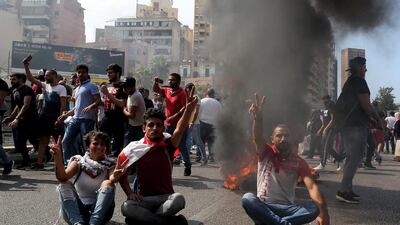“The people want the fall of the regime,” chanted hundreds of Lebanese as they marched through downtown Beirut on Sunday morning to protest Lebanon’s worsening economic crisis.
Organised by several civil society affiliated groups, the demonstration turned briefly violent as protesters threw water bottles at riot police and tried to break through barriers blocking the entrance to Parliament Square.
"Revolution, revolution," shouted the crowd as it walked from Beirut's iconic Martyr's Square through the city centre and towards parliament.
A few hours later, protesters blocked roads and burnt tyres in the capital, and in big cities such as Tripoli and Saida.
State-run National News Agency said one protester was arrested.
Their complaints included the recent shortage of United States dollars in the local market — which is used interchangeably with the local Lebanese pound — to last year's increase in value-added tax and the expensive healthcare system.
Protesters were united in their rejection of the government’s policies and their fear of increasing living costs.
"The government is stealing from us. We are paying taxes but there is no electricity and no water," said Abbas Hamdoun, who carried the purple banner of political party Sabaa that read "return the looted funds".
Corruption is believed to be the main reason successive governments have been unable to deliver electricity round the clock since the end of the civil war in 1990.
In addition to daily electricity cuts, water shortages are also common.
"We want to warn politicians that if they continue suffocating the people, we will revolt," said businessman Wajih Demerji, who said he was one of the organisers of the demonstration.
In July, the government passed an austerity budget to curb the ballooning public debt by cutting public spending and imposing new taxes.
Two months later, Prime Minister Saad Hariri admitted that Lebanon was in a "state of economic emergency" after the global rating agency Fitch downgraded its credit rating, stating that default was a possibility.
Despite the country’s economic woes, politicians said that the fixed exchange rate of 1,507 Lebanese pounds to the dollar, applied since 1997, would be maintained.
However, US dollars have grown scarce in the past few weeks, causing strikes among petrol station owners.
They buy fuel from abroad in dollars and sell it to their customers in Lebanese pounds, meaning they have been forced to exchange their local currency on the black market at rates that reportedly exceeded 1,600 Lebanese pounds to the dollar this week.
On Friday, the government introduced a mechanism allowing them to buy their fuel in Lebanese pounds, but worries persist as commercial banks restricted cash withdrawals at ATMs.
One banker, who asked not to be named, told The National that dollars remain available for clients who request them in person at their bank, but that they have been forced to ration them.
Earlier in the week, governor of the central bank Riad Salameh denied that Lebanon was facing a dollar crisis.
Lebanon’s fiscal deficit has increased recently due to regional instability and the government’s incapacity to reform its finances.
The state spends about $2 billion (Dh7.34bn) a year subsidising the national utility company, Electricité du Liban. It has a public debt of around $86bn — as a percentage of GDP, that is among the highest in the world.
The last time the Lebanese pound was devalued was in 1992, when it exceeded 2,500 to the dollar. The resulting riots led to the government at the time resigning.
“What we are seeing is similar to the beginning of the 1992 crisis,” said Mr Damerji, as he stood in Martyr’s square.
“What we see now is not a military war, but an economic one.”

